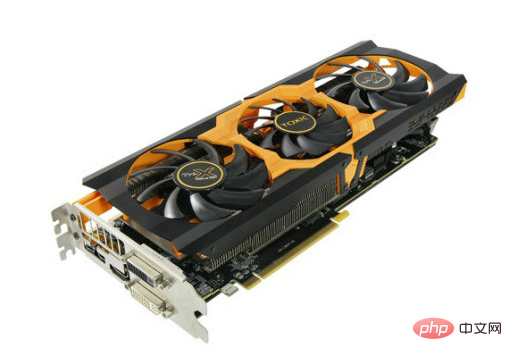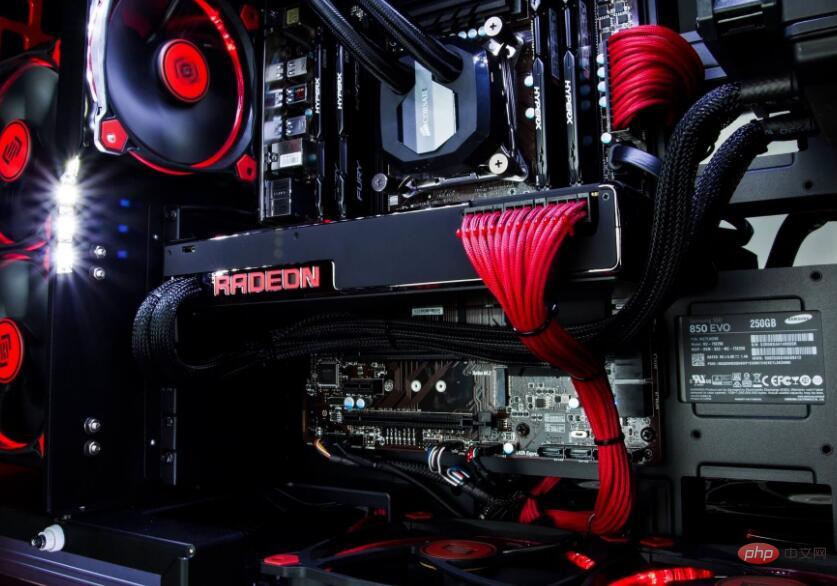
Reason: NVIDIA and AMD have mastered the core technology of graphics cards and monopolized the market. In the early years, there were far more graphics card manufacturers on the market than AMD and NVIDIA. However, the chip industry invested hugely. Other manufacturers were gradually eliminated in the long-term market competition, leaving only two; NVIDIA acquired Voodoo, and AMD acquired ATI, the two dominant players in the independent graphics market have continued to this day.

The operating environment of this tutorial: Windows 7 system, Dell G3 computer.
Why are there only Nvidia and amd for graphics cards?
This is probably the result of years of business competition. These two companies have mastered the core technology of graphics cards and monopolized the market.
In fact, more than ten years ago, these two manufacturers were not the only ones developing graphics cards and GPU chips. For example, there were also the famous 3Dfx, which was well known at the time and players were crazy about it. When it debuted, it was not as popular as this There are two families.
It’s just that the chip industry has invested hugely, and other manufacturers have gradually been eliminated in the long-term market competition. In the end, only these two are left. Later, NVIDIA acquired Voodoo and AMD acquired ATI, and the two dominant players in the independent graphics market have continued to this day.

What is the difference between amd graphics card and Nvidia graphics card
1. Different GPU stream processors
1. AMD graphics card: The five stream processing units of each stream processor in the AMD graphics card's GPU are fixed and cannot be disassembled and reorganized. Each stream processor can only process one 4D instruction. There is one stream processor. The unit is idle but cannot join other groups to work together.
2. NVIDIA graphics card: Each stream processor in the NVIDIA graphics card's GPU has a complete ALU function, and each stream processor can work fully when an operation instruction is issued.
2. Different architecture execution
1. AMD graphics card: The architectural advantage of AMD graphics card lies in its theoretical computing power, but its execution efficiency is not high and its adaptability to complex and changeable task types is not strong. , which requires software support to achieve its due performance.
2. NVIDIA graphics card: NVIDIA graphics card architecture has extremely high execution efficiency and strong flexibility. It is easy to exert its due performance in practical applications, but power consumption is difficult to control, and fewer processing units also limit its performance. Theoretical computing ability.
3. Differences in multi-screen output
1. AMD graphics card: The strength of amd graphics card is that A card can achieve six-screen output on a single card. With the characteristics of architecture and video memory, even Under multi-screen high resolution, the performance degradation is also smaller than that of its opponents.
2. NVIDIA graphics cards: In terms of 3D vision technology, NVIDIA graphics cards have the advantage in the early stage, followed by the A card. Since the A card 3D vision technology is free and open, the selectivity is higher. .
Expand knowledge:
Graphics card (Video card, Display card, Graphics card, Video adapter) is one of the basic components of a personal computer. It converts the display information required by the system to drive the display, provides progressive or interlaced scanning signals to the display, and controls the correct display of the display. It is an important component connecting the display and the personal computer motherboard. It is one of the important devices of "human machine". The built-in parallel computing capabilities are currently also used for operations such as deep learning.
The graphics card, also known as the video card, is an important part of the computer and is responsible for outputting and displaying graphics. For those who like to play games and engage in professional graphic design, the graphics card is very important. The display chips of mainstream graphics cards are mainly manufactured by two major manufacturers, NVIDIA (NVIDIA) and AMD (AMD). Graphics cards using NVIDIA display chips are usually called N cards, while graphics cards using AMD display chips are called A cards.
Computers with higher configurations include graphics card computing cores. In scientific computing, graphics cards are called display accelerator cards.
The video chip (Video chipset) is the main processing unit of the graphics card, so it is also called the Graphic Processing Unit (GPU). GPU is the concept first proposed by NVIDIA when it released the GeForce 256 graphics processing chip. . Especially when processing 3D graphics, the GPU allows the graphics card to reduce its dependence on the CPU and complete some of the work that originally belonged to the CPU. The core technologies used by GPU include hardware T&L (geometric conversion and lighting processing), cubic environment material mapping and vertex mixing, texture compression and bump mapping, dual texture four-pixel 256-bit rendering engine, etc. Hardware T&L technology can be said to be the core of GPU symbols of.
The various 3D special effects supported by the graphics card are determined by the performance of the display chip. The type of display chip used roughly determines the grade and basic performance of the graphics card, such as NVIDIA's GT series and AMD's HD series.
There are many ways to measure the quality of a graphics card. In addition to using test software to test and compare, there are many indicators for users to compare the performance of graphics cards. The main factors that affect the performance of graphics cards include graphics card frequency, display memory and other performance index.

illustrate:
Intel has launched its own independent graphics card. If Intel's independent graphics can survive healthily and steadily, then the graphics card market will be a tripartite competition between NVIDIA, AMD and Intel.
As a leading company in the processor market, Intel has been coveting the independent graphics card market for more than a day or two. It has spent a lot of money preparing to launch independent graphics cards this time. In addition to poaching AMD's high-end talents at high prices, it also The establishment of graphics card factories in emerging markets such as India seems to be intended to compete with Nvidia and AMD. However, the accumulation of the market cannot be formed in a day or two. No one can guarantee the level to which Intel's independent graphics can develop.
In general, as NVIDIA and AMD graphics card technology develop faster and faster, the threshold for other manufacturers to enter this market is getting higher and higher, but for us melon-eating people, this is not a problem. This is not a good thing. When there is competition, NA will feel pressure and launch more high-quality and low-price products.
For more related knowledge, please visit theFAQcolumn!
The above is the detailed content of Why are there only Nvidia and AMD graphics cards?. For more information, please follow other related articles on the PHP Chinese website!